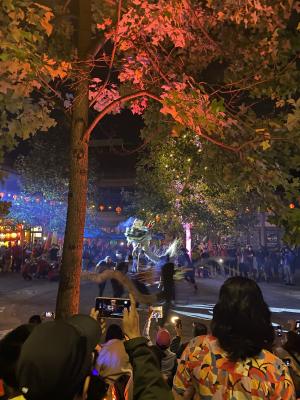Reviving an old tradition, the community came together today to welcome the Fire Dragon. Very appropriately, the story says that "In a dream, Buddha appeared before an elderly villager and told him to hold the Fire Dragon Dance to drive away the plague". Dancing will set you free, indeed!
We were welcomed by a dance even before we entered Sun Yat-Sen garden (worthy of an entry all to itself!). Dancers animated several four-legged creatures that reared their heads and stomped their feet to the sounds of the drum.. It wasn't until I searched "Dragon Dance" that I realized these are not dragons as I had thought, but lions:
Lion dance (traditional Chinese: 舞獅; simplified Chinese: 舞狮; pinyin: wǔshī) is a form of traditional dance in Chinese culture and other Asian countries in which performers mimic a lion's movements in a lion costume to bring good luck and fortune. The lion dance is usually performed during the Chinese New Year and other Chinese traditional, cultural and religious festivals. It may also be performed at important occasions such as business opening events, special celebrations or wedding ceremonies, or may be used to honour special guests by the Chinese communities. (Wikipedia)
https://youtu.be/8g4B0X0Yw_UThe power and grace of the dancers was astounding and the display of animal dominance and displacement behaviour very believable. "The Chinese lion dance is normally operated by two dancers, one of whom manipulates the head while the other forms the rear end of the lion. It is distinguishable from the dragon dance which is performed by many people who hold the long sinuous body of the dragon on poles. Chinese lion dance fundamental movements can be found in Chinese martial arts, and it is commonly performed to a vigorous drum beat."
Interestingly, the wikipedia article points out that "The lion is not native to China (a species found in Northeast China Panthera youngi had long become extinct),[5] and the Lion Dance therefore has been suggested to have originated outside of China from countries such as India or Persia,[6][7] and introduced via Central Asia.[8]
For the fire dragon dance, after many speeches and recognitions, the dancers elevated the dragon's head and its long tail - all of which were covered in burning incense sticks.
https://youtu.be/UQgpMFQtKNoThe Dragon dance (simplified Chinese: 舞龙; traditional Chinese: 舞龍; pinyin: wǔ lóng) is a form of traditional dance and performance in Chinese culture. Like the lion dance, it is most often seen in festive celebrations. The dance is performed by a team of experienced dancers who manipulate a long flexible figure of a dragon using poles positioned at regular intervals along the length of the dragon. The dance team simulates the imagined movements of this river spirit in a sinuous, undulating manner. [Wikipedia again - donate! :)]
The dragon dance is often performed during Chinese New Year. Chinese dragons are a symbol of China's culture, and they are believed to bring good luck to people, therefore the longer the dragon is in the dance, the more luck it will bring to the community.[1]
Which gets me into a quick digression onto one my my interests: the boundaries or magic, superstition and religion. As Wikipedia and I'm sure many anthropological articles say, such and such is "believed to bring good luck to people" and with that description, placing the experience into the category of superstition and folklore. Distancing it from our sanctioned and sanctified religious superstitions and rituals also "believed to bring good luck". How is a baby's baptism or a wedding vow blessing any different?
In the fire dragon dance, the incense oozing dragon was egged on by another dancer with a pole supporting ball. According to "History of the Chinese Dragon Dance" this is meant to symbolize the “Pearl of Wisdom.” The dragon is chasing this “pearl of wisdom” to pursue insight and knowledge.
I did not see the dragon capture the pearl....
I welcome all additional thoughts and comments. This is not my area of expertise, and if you have corrections or commentary, please do let me know!


Add new comment